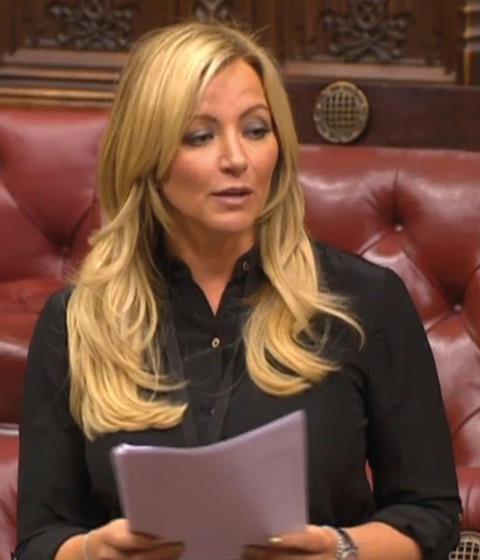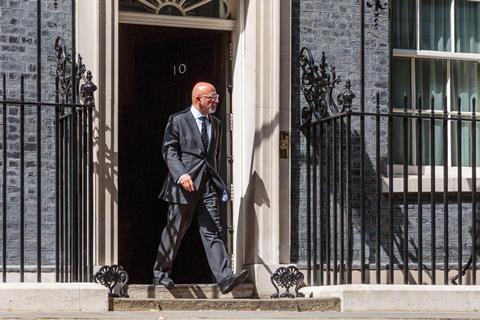Controversial lingerie tycoon Michelle Mone has triggered fresh public debate on UK libel and defamation tactics. But the prospect of further reform to combat so-called SLAPPs continues to divide the profession
Sometimes you can detect the likelihood of law reform in the very air. For media and reputation lawyers, the tasting session seems well advanced. That is because strategic litigation against public participation (SLAPPs) is a subject of controversy for the legal profession that refuses to go away. It fits with the persistent and powerful impression that, using the law, ‘might’ can exhaust and neuter the ‘right’ – that those with adequate resource can prevent public scrutiny of their affairs and shield criticism that dents their reputation.
There has been recent, but limited, law reform in this area. The Economic Crime and Corporate Transparency Act was amended by government to tackle SLAPPs which feature economic crimes, providing defendants with greater protection when faced with legal action. The reform includes an early dismissal mechanism and a new cost protection regime for defendants; and defines a SLAPP in legislation for the first time.
Economic crime, though, is hardly the full story. A comprehensive model anti-SLAPP law has been drafted by campaigners that would allow judges to dismiss cases early on, cap costs and punish vexatious suits with damages. Last October, the government said it is considering future legislative options to introduce comprehensive anti-SLAPP measures ‘as soon as parliamentary time allows’. We are still waiting.
Most activity by lawyers that is complained of might more properly be dubbed ‘PLAPPs’, as it comprises the use of pre-action letters threatening recourse to law that may arguably have a more widespread chilling effect on ‘public participation’ and media scrutiny than formal litigation, including where injunctions are actually sought.
In May 2022, the Law Society said action was needed to ‘level the playing field between parties and protect the administration of justice’. Chancery Lane has broadly supported law and regulatory reform to curb SLAPPs. The Solicitors Regulation Authority has published a warning notice.
When peer and entrepreneur Michelle Mone admitted lying about her own and her husband’s links to PPE Medpro, the letters sent by her lawyers threatening action and denying such links were widely criticised. Those letters join a body of evidence that is fuelling demands for further action from within the legal profession; and increasing political and media pressure from without.
And yet, the solid body of evidence the SRA sought on SLAPPs has proved elusive for the regulator. The SRA’s November 2022 ‘warning notice’ appeared apposite, but research for its thematic review of the topic did little to underpin its stance. The regulator’s review of 50 files from 25 law firms known to handle ‘reputation management’ did not identify inappropriate use of key terms in correspondence, such as ‘strictly private and confidential’, ‘not for publication’ and ‘without prejudice’.

The failure to identify misconduct in its review provided ammunition for the Society of Media Lawyers (SML), a newly formed group of leading media lawyers engaged in a rearguard action against SLAPPs legislation. The group contrasted the SRA’s survey with the eight occasions that the Law Society had publicly criticised ‘SLAPPs’ and supported calls for reform. The SML has accused Chancery Lane of failing to represent its members’ interests – an accusation the Society has denied. President Nick Emmerson said last November: ‘Naturally there is huge interest in the question of SLAPPs reform, and we understand the concerns that media lawyers have. Many Society of Media Lawyers members played an active role in shaping our position through our working group. The Law Society has to balance its position carefully taking into account the interests of members – both claimant and defendant – access to justice and the rule of law. We’re happy to work with the Society of Media Lawyers to further inform our thinking – just as we are happy to hear all positions.’
SML’s vice-chair Iain Wilson, partner at media and litigation firm Brett Wilson, tells the Gazette: ‘Where a publication or proposed publication is prima facie unlawful because it is private, confidential or defamatory, it is perfectly proper for a solicitor, on instructions, to send a letter to the publisher warning them of the potential consequences of publication.’
There is a misconception that lawyers ‘gag’ publishers, Wilson argues: ‘If a publisher is confident that their proposed publication is lawful then they are free to go ahead and publish. If they are unsure, it is relatively inexpensive to obtain pre-publication legal advice – my firm offers such advice on a modest fixed fee basis… Personally, I find it misleading when publishers say they have been “gagged” and there is no court order. Privacy injunctions are actually very rare.’
Is it possible that the SRA is looking in the wrong place? Media lawyer Jonathan Coad, who acted for Mone, offered his ‘unqualified apology’ to the Guardian for incorrectly stating his client had no connection to the PPE contracts. He is, though, unusual among public examples in being a member of the SML. Two other lawyers who acted for Mone are not.
Osborne Clarke, acting for former chancellor Nadhim Zahawi, sent ‘confidential and without prejudice’ correspondence to tax lawyer and campaigner Dan Neidle over their client’s tax affairs, which Neidle made public while also making a report to the SRA. Zahawi was forced from office when the prime minister’s ethics adviser found multiple breaches of the ministerial code directly related to this matter. The firm, which has declined to comment, has a recognised reputation management practice, and its lawyers are among SML’s members.
Other firms sending letters to publications are less renowned for such work but still engage in it. The Gazette itself has been in receipt of pre-action letters from firms with no recognised media law specialism.
Notwithstanding the SML’s fierce opposition, more dramatic reforms of policy and practice are now being urged from within the legal profession.
'SLAPPs is that horrible mixture of public opinion and ethical judgement. It is a field which is still developing, which makes it difficult for the publishers of investigative journalism who wish to shine a critical light through scrutiny in the public interest'
Paul Bennett, Bennett Briegal
On the opposite side of the barricades, leading professional regulation lawyer Paul Bennett, partner at Bennett Briegal, calls for ‘every attempt to silence publishers’ to be reported to the SRA, so the regulator can provide clarity on what does and does not constitute a SLAPP. He argues that the approach set out in SRA guidance fails to provide certainty for solicitors and publishers, in part because it is based on an ‘evidence base’ that remains ‘modest’.
‘[SLAPPs] is that horrible mixture of public opinion and ethical judgement,’ Bennett says. ‘It is a field which is still developing, which makes it difficult for solicitors, legal regulators and importantly the publishers of investigative journalism who wish to shine a critical light through scrutiny in the public interest.’
He adds: ‘Universal reporting of any attempt to silence a publisher using legal threats would allow the SRA to be braver and clearer… on what is and is not a SLAPP as the evidence base… developed.’

Universal reporting would be a dramatic change in practice in this area, though not a direct change in regulatory rules. The SRA’s Warning Notice on SLAPPs already stresses the importance of protecting public scrutiny and investigative journalism. And as Bennett points out: ‘It also warns against framing the costs consequences excessively and seeking to intimidate.’
The increasingly high-profile Neidle’s experience of letters from lawyers acting for Mone has led him to back calls for further legislative reform. Writing in The Times last month, Neidle said: ‘Here’s a modest proposal. Any letter threatening defamation proceedings should be accompanied by a “statement of truth”. The claimant would have to say, under threat of perjury, that the statements in the letter are correct and that the defamatory statement complained of is false. Any breach should be aggressively prosecuted. And where a claimant provides a false statement of truth, the defendant should be able to sue to recover their legal costs, plus punitive damages.’
He added: ‘The grave consequences of a false statement would make all libel claimants consider, very carefully, how sure they were of their position. Making legal threats based on a lie would have consequences.’
'The proposal that letters of claim be accompanied by a statement of truth is not a new one. I have no objection to the CPR being amended accordingly'
Iain Wilson, Brett Wilson
Wilson’s response to Bennett’s proposal is blunt: ‘The suggestion that every attempt to discourage publication should be reported to the SRA is both naive and reckless,’ he counters. ‘The law strikes a careful balance between two fundamental ECHR rights: one, the right to respect for a private life, including protection of reputation; and two, freedom of expression.’
Wilson argues: ‘In pursuing their anti-defamation/privacy agenda, campaigners – often self-interested journalists – tend to completely disregard the former, or fail to acknowledge that the latter is a qualified right.
‘[Neidle’s] proposal that letters of claim be accompanied by a statement of truth is not a new one. I have no objection to the CPR being amended accordingly, although there is no obvious reason why such a requirement should be limited to the law of defamation/privacy.’
Wilson adds, however, that ‘where there are no court proceedings, I am not sure that the offence of perjury would be committed… but there is recent Court of Appeal authority that confirms contempt of court proceedings can be brought.’
Referring to that authority, in Jet2 Holidays Limited v Hughes & Hughes [2019] EWCA Civ 1858, he notes: ‘In these circumstances, the High Court has the power to impose a period of imprisonment of up to two years. Additionally, criminal liability may arise under section 2 of the Fraud Act 2006 (fraud by false representation), which carries a maximum sentence of 10 years.’
There is also, he points out, the possibility of a civil claim for damages in the tort of deceit to recover legal fees.
It is worth noting too that legal process has still to catch up with the modern communication age. The spread of print media shaped the modern world, and this had a profound effect on knowledge, laws and culture across different jurisdictions. The same is true of the digital age. Therefore, what matters in other jurisdictions has an impact here. Where once people came back from the US or Australia with copies of Peter Wright’s 1987 MI5 memoir Spycatcher, which was banned in the UK, proscribed information is now easily obtainable online.
It is also worth keeping an eye on the US, where over 30 states have variations of anti-SLAPP laws that provide for the early dismissal of claims. In 2022 Democrat congressman Jamie Raskin introduced legislation to introduce a federal anti-SLAPP statute. This failed, but efforts are ongoing to revive the legislation with bipartisan support.
As with so much else, perhaps it all comes down to money. It is not that information cannot leak, and true information cannot be forced into the public domain. The point for journalists and publishers is that if they are not the ones to release such information, having invested in discovering it, there is no viable return on the Fourth Estate’s efforts in doing so.
There are two discernible sides in the debate on SLAPPs, but perhaps within the legal community the distance between professionals is narrower than sometimes suggested. As SML’s Wilson puts it: ‘Without commenting on any particular case, dishonest litigants deserve all they get for attempting to abuse the system.’




































No comments yet